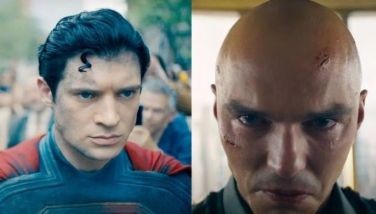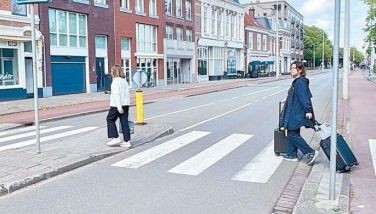A heart in Seoul

June 10, 2002 | 12:00am
 The feeling hit us early last Friday evening as soon as Asiana Airlines Flight 372 from Manila landed at the impressive Incheon International Airport, more than an hour by car to Seoul where GMA’s Paolo Bediones and I were to cover the Asian press junket with Will Smith, Tommy Lee Jones and Lara Flynn Boyle for Men in Black II (a.k.a. MIIB) which will be shown in Metro Manila on July 17.
The feeling hit us early last Friday evening as soon as Asiana Airlines Flight 372 from Manila landed at the impressive Incheon International Airport, more than an hour by car to Seoul where GMA’s Paolo Bediones and I were to cover the Asian press junket with Will Smith, Tommy Lee Jones and Lara Flynn Boyle for Men in Black II (a.k.a. MIIB) which will be shown in Metro Manila on July 17.
"The Koreans seem to be distant," observed Paolo who was visiting Korea for the first time, just like me. "They seem to be prim and proper, somewhat like the Japanese."
It must be the language barrier, I told Paolo.
Like in some Asian countries (Thailand, for instance), not many Koreans seemed to speak English, at least perhaps not those from whom we were asking for directions to the shuttle-bus stop for The Westin Chosun Hotel where our host, Columbia Pictures, booked the more than two dozen entertainment print and TV journalists from all over Asia (Singapore, Malaysia, Hong Kong, Taiwan, etc.)
Paolo’s initial impression was wrong, I soon found out.
After the whole-day print/TV interviews, I took advantage of the remainder of our barely 36 hours sojourn in Seoul by exploring a little part of the city which was, I discovered, very clean (surroundings and air – look, mga kababayan, no pollution!) from the wide avenues to the side streets where the weekend tiangge was attracting a big crowd that Saturday afternoon.
When I applied for a visa last week, Dr. Lee Soon-chun, Deputy Chief of Mission Minister and Consul General, wondered if, besides the interviews with the MIIB stars, I was going to Seoul for "something else" – you know, maybe to watch one of the matches in the ongoing World Cup. Not being a sports buff, I asked Dr. Lee, "World Cup? Tennis, you mean?" I thought I saw Dr. Lee gasp at my ignorance. He picked up a copy of Newsweek in his table, showing a Japanese athlete on the cover, and said, "Football!" Oh, yes, of course, football!
In the next breath, I told Dr. Lee that I’d like to watch Chihwaseon, the Korean film that won for Korean grandmaster Im Kwon Taek (comparable to our very own late Gerry Manong de Leon and Lino Brocka) the Best Director Award at the just-concluded Cannes Film Festival, in a tie with American director Paul Thomas Anderson (for Punch-Drunk Love). "If it’s still showing in Seoul," I added.
So that’s just what I did Saturday afternoon after my interviews with Will and Tommy and Lara – call the Chosun Hotel concierge to check which moviehouse Chihwaseon was showing and how I could get there. Armed with a map, I set out on foot, turning right from the hotel exit and then left into those side streets where rows and rows of tiangge were, losing my way and then finding it and then losing it and finding it again, convincing me beyond doubt that, in a foreign land, the best way to find your way is losing it and finding it along the way.
True enough, Chihwaseon was showing in a mini theater at the 10th floor of a shopping mall.
I paid the 7,000 won admission ticket (roughly P350) and asked the box-office girl if the movie had English subtitles. No, she said (ready and willing to give me a refund if I asked for it, I presumed), and I promptly assured her that it was okay. "I’d watch the movie even if it was in Greek," adding that I’d been reading about the film and I thought I knew enough to enjoy it.
Besides, film is a visual medium and even if you don’t understand the dialogue, you can enjoy it as much as or maybe even more than those who do because you’re challenged to use your imagination more. It’s like watching the Q&A portion of the Miss Universe Pageant and a Miss Korea is answering the decisive question (such as… What makes you blush?) in Korean. You don’t understand what she’s saying but you know that she’s saying something interesting and something right and that’s more than enough, isn’t it?
Chihwaseon is the story of the 19th century painter Jang Seung-Up (known as Ohwon) who realizes that he can only create masterpieces when he is drunk, much like Edgar Allan Poe who wrote his own masterpieces under the influence… The tragedy is that the painter becomes too emotionally drained to enjoy the beauty of his creation. Im Kwon Taek ("Maybe the most famous director you’ve never heard of," according to the Time story entitled The Unbearable Sadness of Being Korean) has been directing for 40 years, with more than 100 films to his credit. Chihwaseon is, no doubt, his crowning glory because of its Cannes victory.
Initially, as Chihwaseon reeled off, I felt insecure and self-conscious being the only one in the audience who didn’t understand what was being said by the actors but trying hard to figure things out. But soon, the magic of cinema began to work on me. I pleasantly discovered that I could, as I did, enjoy the movie, mesmerized by its visual power.
The way I understood it, the painter becomes so drunkenly engrossed in his consummate artistic pursuit that he neglects his wife (in one scene, I think he rejects her sexual advances by waking up and, instead of giving in to her, turning to the bowl of wine beside their bed), so she finds solace in the arms of a nocturnal visitor. The painter slaps and punishes his little child who, I think, wants to follow in his footsteps as an artist (but not a drunkard), but the child loves him and adores him just the same.
The cinematography and production design are breathtaking, as if every scene has been framed like a huge painting that captures the green and red and yellow and blue and myriad colors of ancient Korea – green trees swaying, bright-colored flowers under the sun, golden grass laid out like a soft carpet, even a barren landscape still beautiful as if immortalized on a large canvas.
Besides the awesome imagery, there’s the actors’ performances to marvel at. They’re so good that, even if I didn’t understand the dialogue, I got involved in the lives of the characters they’re portraying, I rejoiced with them in their moments of ecstasy and wallowed with them in the depth of their despair.
Since you might get the rare chance of watching Chihwaseon maybe not in Seoul but somewhere else, hopefully in Manila if we can convince Dr. Lee Soon-chun to sponsor a special screening for local cineastes (please, Dr. Lee?), I won’t tell you how the painter’s life ends. Suffice it to say that it’s a death as consummate as his passion for his art.
Two love scenes stood out and haunted my memory even as I bade Seoul goodbye, and Paolo and I took our Asiana flight back to Manila yesterday afternoon. One shows the painter in white kimono and his lover in bright red and bright yellow Korean costume, he half-lying on the grass and she astride him, with both of them gently swaying with the grass, conversing even as they anticipate the climactic moment. A real splendor in the grass!
The other scene shows the painter making love, naked naturally, on the floor with another woman, the soundtrack vibrating with their moans and groans, and just then Japanese soldiers (I think) come to arrest the painter, literally yanking him from atop the woman when they’re about to climax, his come, shown in split second, spurting onto her lap. What love scene could be more erotic than that!
I just hope that if and when Chihwaseon reaches our shores, it will be reviewed by the broad-minded sector of the MTRCB and they won’t delete even a second from it so as not to spoil Im Kwon Taek’s classic masterpiece. I really, really, really hope they won’t.
After watching Chihwaseon, I felt as if I found a heart in Seoul, the soul of Korea, and I began to understand the "distant" Koreans better in the limited time I spent in the city.
(Note: Watch for my interviews with Will Smith and Tommy Lee Jones in Conversations with Ricky Lo in future issues of The STAR. And if ever Chihwaseon gets shown here, drop everything and watch it. It’s an experience of a lifetime, I assure you!)
BrandSpace Articles
<
>
- Latest
- Trending
Trending
Latest
Trending
Latest
Recommended

























 Exclusive
Exclusive









